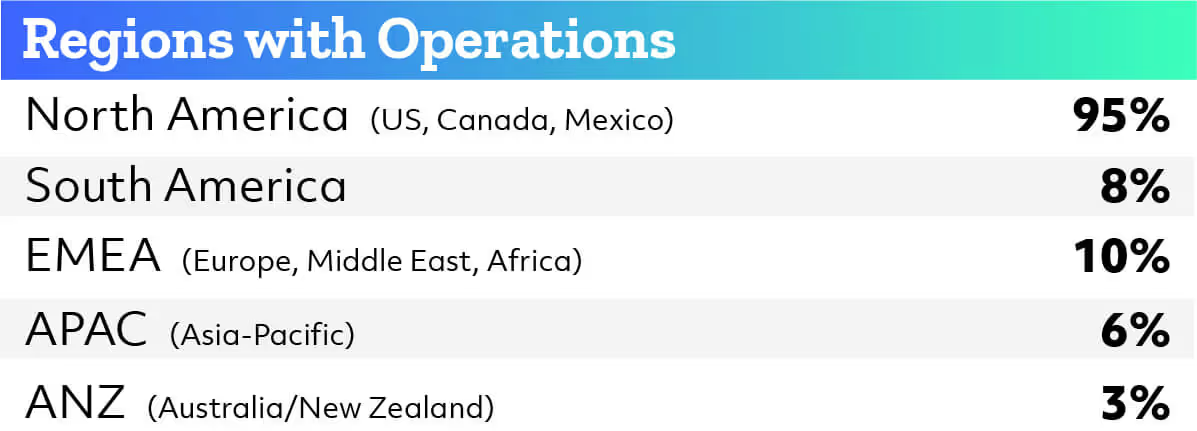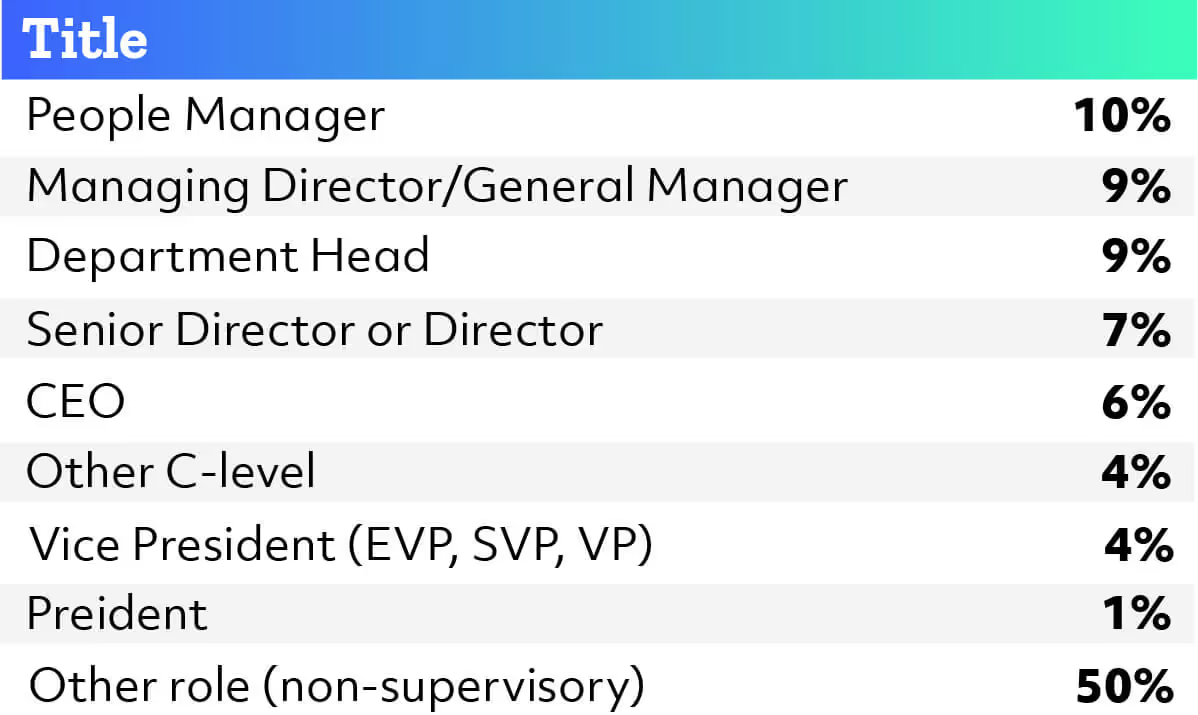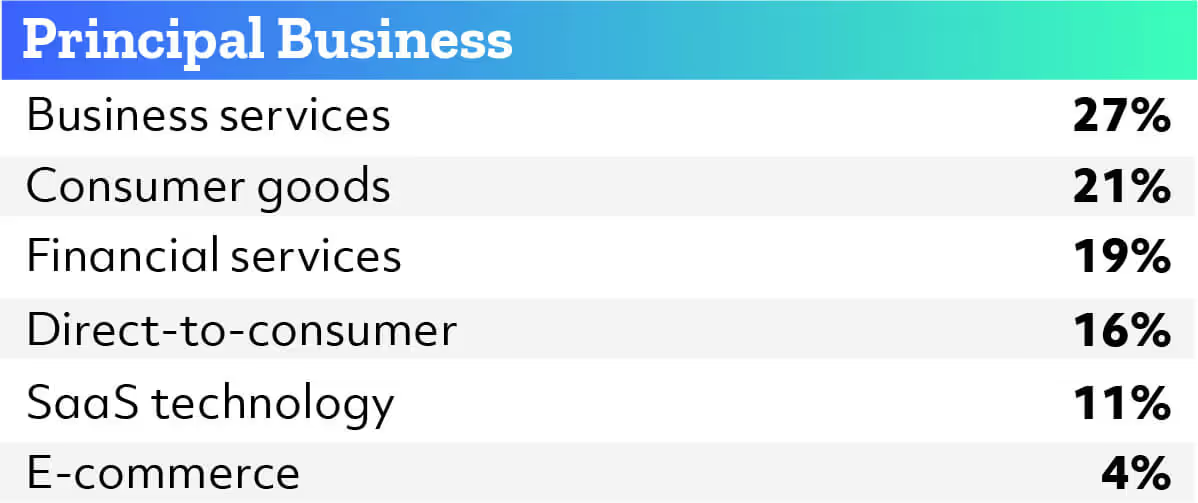A letter from our CEO
Digital collaboration tools are having a moment. COVID-19 has put the ongoing transition to remote and distributed work into overdrive, and we’ve all seen companies scramble to enhance digital workflows, improve team coordination, and streamline team communications. But what does any of this mean in a vacuum of common understanding?
In this report, we put a spotlight on knowledge management — arguably the next major opportunity for dramatic business impact through digital transformation — and examine how two key groups think about this topic.
We surveyed company leaders and individual contributing employees across organizations in industries like consumer goods, business services, financial services, SaaS technology, and e-commerce.
We found the insights surprising and illuminating, and supportive of the belief that knowledge management matters — a lot — and represents a significant lever to drive business performance.
That said, we don’t see technology as the hero of this — or any — story. This report is really about culture and the people who embody it. We explore how knowledge management activates company values and supports behaviors that bring collaborative knowledge creation and sharing closer to the center of company culture. We also explore the effects; the data indicates they are substantial.
Thank you for joining us as we develop a new perspective through examining research data, surfacing our own insights, and sharing stories of customers on this journey of exploring what it means to have a knowledge-driven culture.
Build your own knowledge-driven culture with Guru
The knowledge culture of high-performing companies
Let’s start with a working definition of culture that’s applicable to the workplace (aka a company culture):
Multiple academic, scientific, and business disciplines converge on this topic of company culture. We’re not going to spend time here trying to recap the decades’ worth of insights from behavioral economics, the social sciences, and neuroscience. But, if you’re working in those fields, we tip our hat to you! 🎩
People’s attitudes, beliefs, and behaviors travel together. By that we mean that each one influences the other two. When you dial up the intensity of one, the others follow. This is true for individuals as well as their larger cultural groups.
So, with that framing in mind, we’re in a good spot to understand the first of our key findings from our research survey.
The perception and performance link
Perceptions (i.e., attitudes and beliefs) of knowledge management are strongly associated with business performance (i.e., behavior). And here’s the kicker: Stronger positive sentiment — more intense attitudes and beliefs — is associated with stronger performance.
We’re not making this up, we swear.
On average, the more intensely someone endorses knowledge management, the more likely they are to also report being part of a high-performing business.
So let’s dive into why high-performing companies have made the jump from simply knowledge-affirming to fully knowledge-driven cultures, and why that distinction matters.
Watch Rick Nucci share his thoughts on knowledge driven culture and key findings from this report

From a knowledge-affirming culture ...
Here’s some good news: nearly all companies, regardless of business performance, are knowledge-affirming, meaning that they place a high level of importance on knowledge. This mentality is particularly prevalent among company leadership.

In fact, the vast majority of the companies surveyed showcased knowledge-affirming beliefs and attitudes:
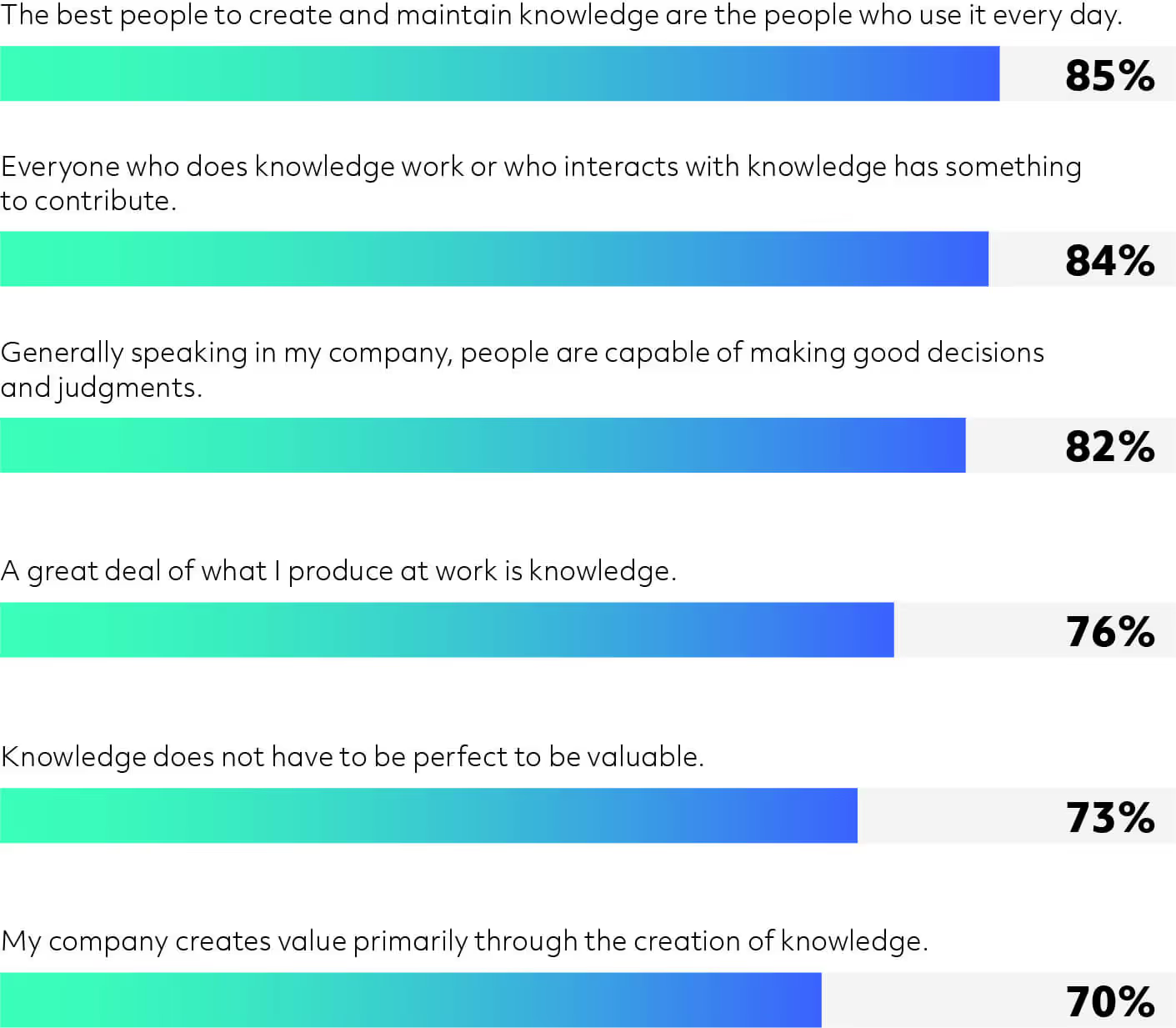
But let’s be real: LOTS of things in business (and in life) are considered important and still fail to find traction or any meaningful follow-through. If both high-performing and low-performing businesses are knowledge-affirming, what indications do we have that core beliefs and values around knowledge make a difference?
… to a knowledge-driven culture
Here’s where that value set becomes a positive force for change:
When knowledge management graduates from being merely important to very or even wildly important, that shift ultimately translates to business performance.
High-performing businesses are much more likely than low-performing ones to rate the knowledge management objectives we queried as “very important.”

It’s also predominantly the high-performing companies that exhibit the attitudes, behaviors, and beliefs that characterize a knowledge-driven culture, meaning knowledge-driven cultures see better business results and more engaged employees. Effectively, knowledge-driven cultures are those that close the gap between knowing and doing.

The state of knowledge management
Employees are speaking. Are leaders listening?
Despite many businesses being broadly knowledge-affirming, company leaders and employees differ in their perceptions of how effective knowledge management efforts are.
Leaders generally saw knowledge management programs as being effective to very effective across the many dimensions, objectives, and business functions we measured; they clearly believe that their organizations are doing a good job.
Employees, on the other hand, are feeling pretty meh. They generally rated efforts as being somewhat effective to effective.
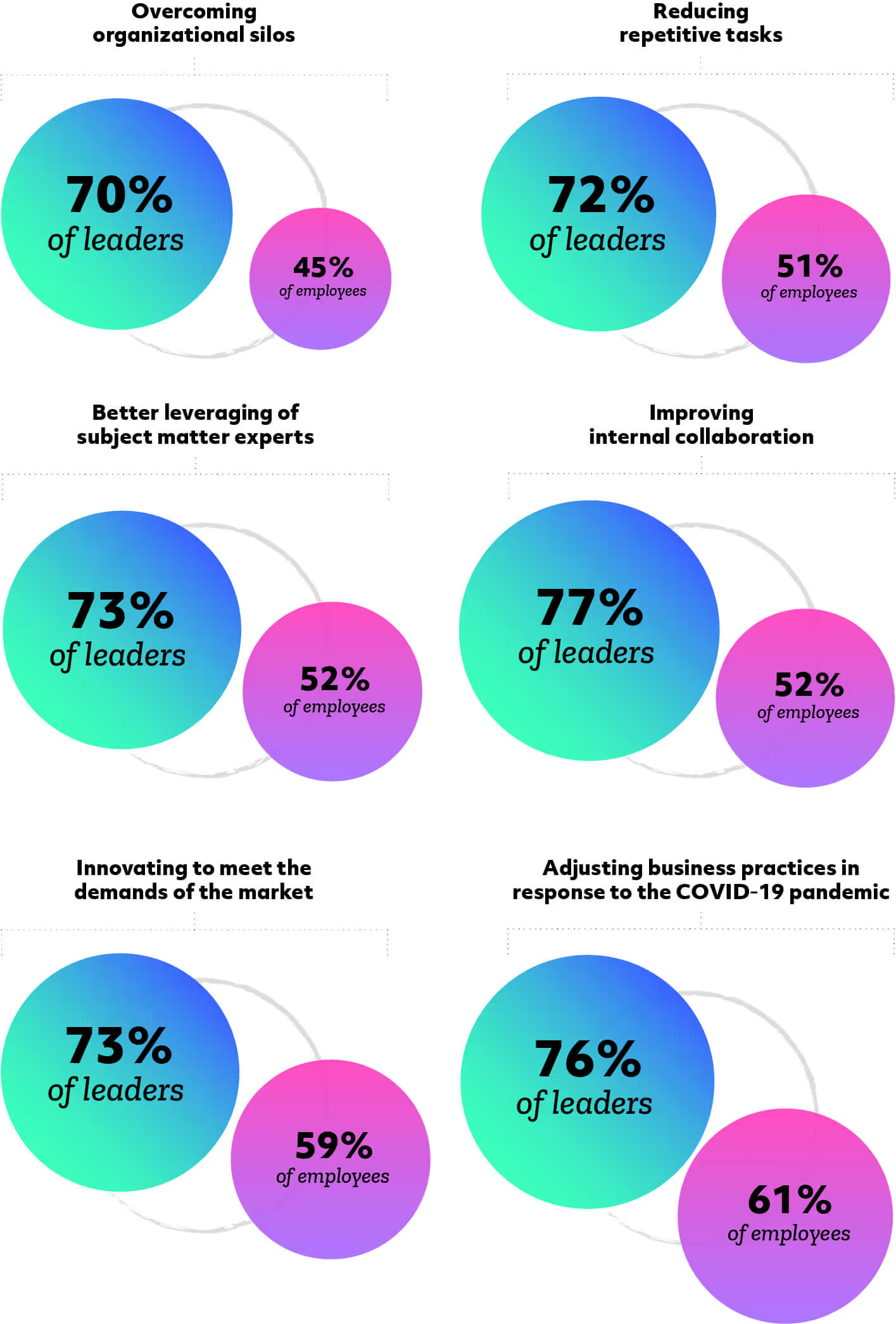
The employee responses here are, in a sense, telling leaders that knowledge management can do better. So what causes this disconnect? It likely stems from the fact that employees and leaders need different things from knowledge management.
Individual contributors usually need to focus on role-specific tasks, such as closing tickets or negotiating a contract, while leadership is looking at top-line business performance and putting together horizon plans. The kind of knowledge individual contributors need may change as frequently as every day, while what leadership needs tends to be longer-lived.
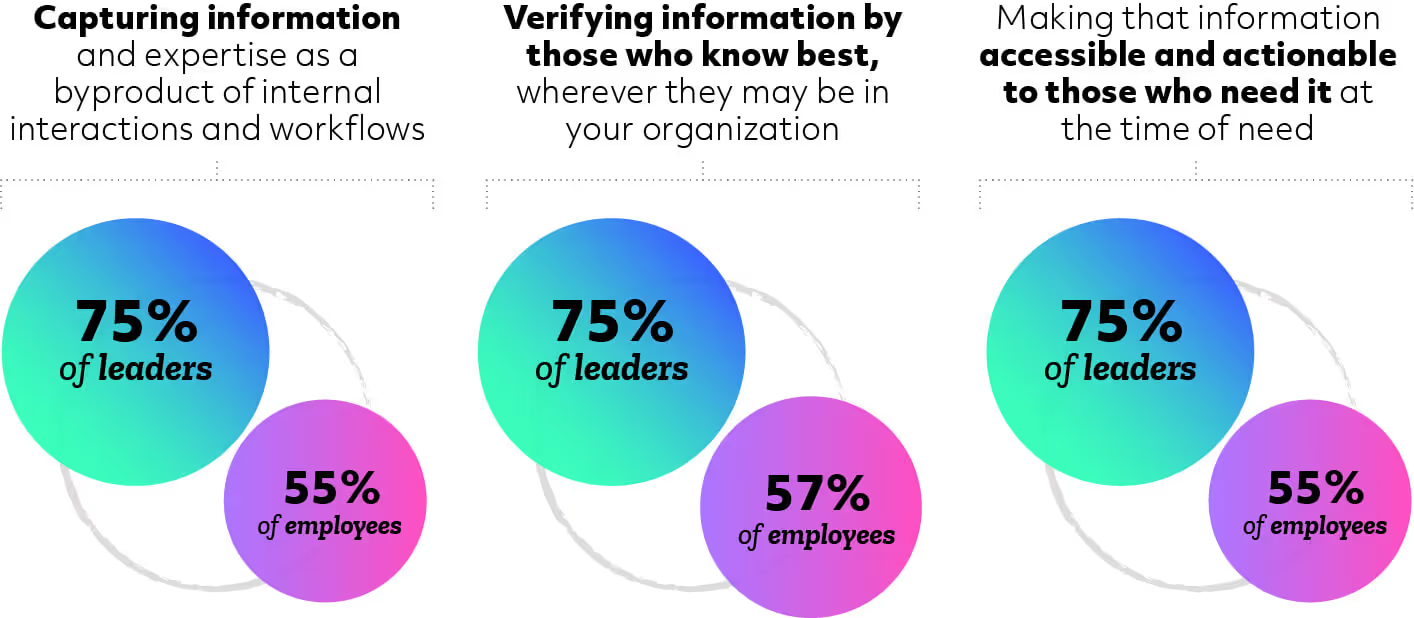
The evolution from a departmental to a broad company imperative
Almost half of the leaders in our sample are familiar with Knowledge-Centered Service (KCS), which is a methodology developed by the Consortium for Service Innovation at the vanguard of customer success and support organizations. KCS values empower everyone to share collective responsibility for creating and maintaining a knowledge base.
Just as Agile and Scrum methodologies have been adapted from software development and applied within other business functions such as marketing and HR, KCS-aligned and -inspired approaches to knowledge management are being pulled deeper into and across the enterprise.
Our findings indicate this uptake remains a work in progress. Customer success is the one business function where employees and leaders totally agree on the importance (if not the effectiveness) of knowledge management to the company. Employees and leaders generally align the importance of knowledge management to sales. Where employees have not yet caught up to leaders is on the importance of knowledge management to marketing, IT, and HR.

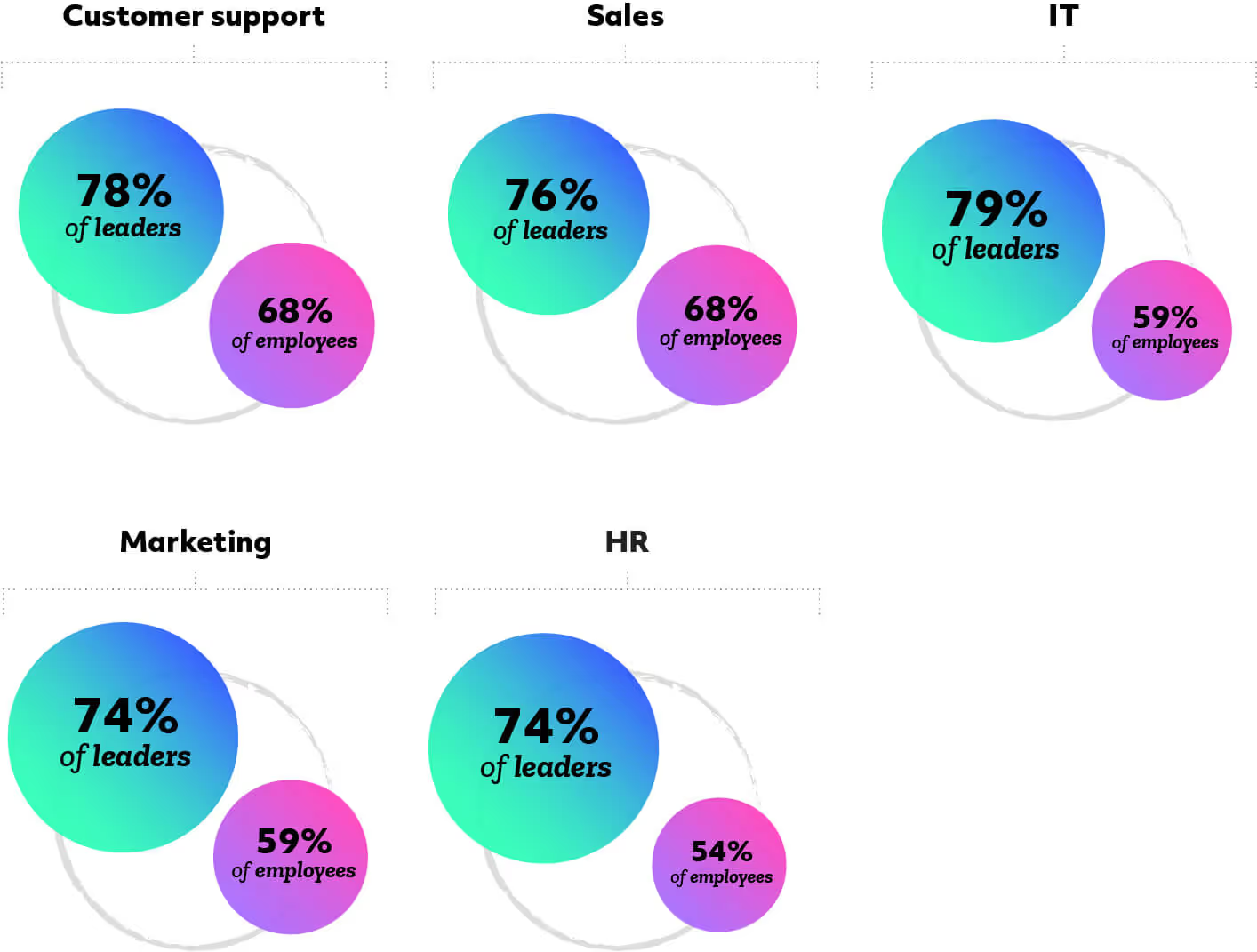
Leadership coaches will counsel that it’s the job of leaders to “get there first” and then bring everyone else along. When it comes to mapping the territory and establishing a vision for the organization that’s knowledge-driven, leaders have gotten there first.
We’ve also seen that the importance of knowledge management is bigger than any single department, and that company-wide imperatives rank at least as important, and sometimes more important, than department-specific contributions do. The job of bringing along everyone else still remains.
The opportunity for knowledge-driven cultures
Knowledge matters when activating customer experience and employee experience strategies
In our survey, respondents who self-identified as being part of knowledge-driven cultures boasted not just high business performance but high levels of employee engagement as well.
These findings echo how today’s market leaders across categories have made it a primary business strategy to orient around the customer experience and the employee experience.
- The customer experience imperative
According to Accenture, companies that organize around the customer experience outperform their competitors by 182%. The customer experience is most influenced by building an emotional connection with customers at every point where they interact with your brand, through product, service, sales, marketing, and brand experiences — many of which are driven by responsive timely interactions that require timely and verified knowledge.
- The employee experience imperative
As companies look to the future, they are working hard to create a more holistic employee experience via digital transformation.
These CX and EX imperatives find complicating factors in two other trends:
- The increased volume of product, customer, and company knowledge and the velocity of that change
- The increased number of apps and systems of productivity required in day-to-day work
Activating and maintaining a CX- and EX-centric strategy requires agility, collaboration, and a commitment to continuous improvement. Becoming a knowledge-driven culture provides the most powerful lever to activate this strategy.
Collaboration is at the heart of knowledge-driven cultures
Everyone has a role to play in a knowledge-driven culture:
- Leaders actively contribute in sharing their knowledge with their teams as well as broadly across the organization.
- Teams work in partnerships, recognizing the critical relationship between seekers of knowledge and subject matter experts.
- Companies prioritize the employee experience in seeking and sharing knowledge when bringing in new processes and technologies.
It’s these kinds of large-scale — and small-scale — collaborative efforts that allow companies to create positive feedback loops. Those positive feedback loops drive better employee experiences, which in turn drive better customer experiences. Those are what allow businesses across the spectrum to create customers for life.
Having a great product or offering with terrible support isn’t enough. No one wants to overpromise and underdeliver. This is especially true in the SaaS space, where companies have to show value at each renewal cycle.
By breaking down silos and actively encouraging cross-functional knowledge sharing, employees at every level — leadership included — will have what they need to adapt to any challenges they may face, whether it’s one unhappy customer or a sudden, whole-company shift to remote work.

